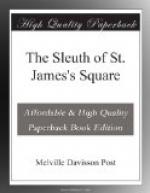Hargrave got in, the footman closed the door, and the carriage turned into Piccadilly Circus. The woman did not pay very much attention to him. She made a laconic explanation, the sort of explanation one would make to a shopkeeper.
“I want your opinion on some jewels,” she said. “I have a lot to do — no time to fool away. When I found that I could see the jewels to-night I concluded to pick you up on my way down. I didn’t find out about it in time to let you know.”
Hargrave told her that he would be very glad to give her the benefit of his experience.
“Glad, nonsense!” she said. “I’ll pay your fee. Do you know a jewel when you see it?”
“I think I do, madam,” he replied.
She moved with energy.
“It won’t do to think,” she said. “I have got to know. I don’t buy junk.”
He tried to carry himself up to her level with a laugh.
“I assure you, madam,” he said, “our house is not accustomed to buy junk. It’s a perfectly simple matter to tell a spurious jewel.”
And he began to explain the simple, decisive tests. But she did not listen to him.
“I don’t care how a vet knows that a hunter’s sound. All that I want to be certain about is that he does know it. I don’t want to buy hunters on my own hook. Neither do I want to buy jewels on what I know about them. If you know, that’s all I care about it. And you must know or old Bartholdi wouldn’t trust you. That’s what I’m going on.”
She was a big aggressive woman, full of energy. Hargrave could not see her very well, but that much was abundantly clear. The carriage turned out of Piccadilly Circus, crossed Trafalgar Square and stopped before Blackwell’s Hotel. Blackwell’s has had a distinct clientele since the war; a sort of headquarters for Southeastern European visitors to London.
When the carriage stopped Mrs. Farmingham opened the door herself, before the footman could get down, and got out. It was the restless American impatience always cropping out in this woman.
“Come along, young man,” she said, “and tell me whether this stuff is O. K. or junk.”
They got in a lift and went up to the top floor of the hotel. Mrs. Farmingham got out and Hargrave followed her along the hall to a door at the end of a corridor. He could see her now clearly in the light. She had gray eyes, a big determined mouth, and a mass of hair dyed as only a Parisian expert, in the Rue de la Paix, can do it. She went directly to a door at the end of the corridor, rapped on it with her gloved hand, and turned the latch before anybody could possibly have responded.
Hargrave followed her into the room. It was a tiny sitting room, one of the inexpensive rooms in the hotel. There was a bit of fire in the grate, and standing by the mantelpiece was, a big old man with close-cropped hair and a pale, unhealthy face. It was the type of face that one associates with tribal races in Southeastern Europe. He was dressed in a uniform that fitted closely to his figure. It was a uniform of some elevated rank, from the apparent richness of it. There were one or two decorations on the coat, a star and a heavy bronze medal. The man looked to be of some importance; but this importance did not impress Mrs. Farmingham.




